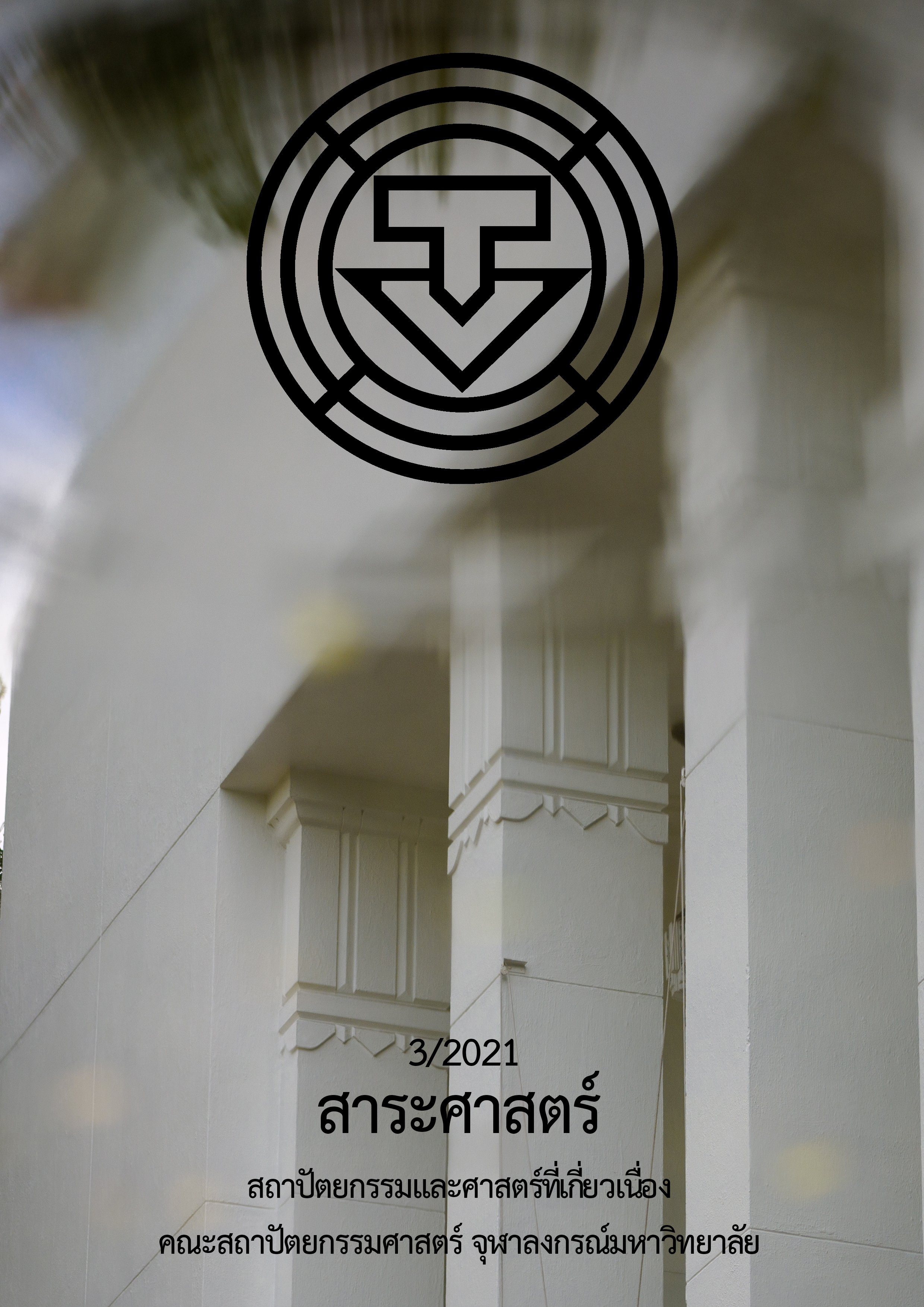กลยุทธ์การปรับตัวของผู้ประกอบการโรงแรมที่ได้รับมาตรฐาน SHA ต่อผลกระทบ COVID-19 ในเขตกรุงเทพมหานคร ปี พ.ศ. 2563
Main Article Content
บทคัดย่อ
สถานการณ์การแพร่ระบาดของไวรัส COVID-19 ทำให้การท่องเที่ยวระหว่างประเทศต้องหยุดชะงักเพื่อควบคุมโรค โดยเฉพาะจังหวัดกรุงเทพมหานครที่เป็นเมืองท่องเที่ยวอันดับหนึ่งของประเทศ และเคยมีรายได้จากนักท่องเที่ยวต่างชาติเป็นจำนวนมากจนส่งผลกระทบต่อธุรกิจโรงแรม ทำให้หลายแห่งต้องปิดกิจการชั่วคราวหรือหากลยุทธ์การปรับตัวในช่วงที่สถานการณ์ยังไม่คลี่คลาย รวมไปถึงการได้รับการรับรองมาตรฐานข้อกำหนดเบื้องต้นเพื่อป้องกัน COVID-19 ที่เรียกว่า Safety & Health Administration (SHA) เพื่อสร้างความมั่นใจให้กับนักท่องเที่ยวภายในประเทศ บทความวิจัยนี้จึงมุ่งศึกษากลยุทธ์การปรับตัวของผู้ประกอบการโรงแรมที่ได้รับมาตรฐาน SHA ต่อผลกระทบ COVID-19 ในเขตกทม. โดยกำหนดกรอบแนวคิดในการวิจัยเป็น 4 ส่วน ได้แก่ 1) ลักษณะและการดำเนินงานของโรงแรม 2) ผลกระทบจาก COVID-19 ที่เกิดขึ้นกับโรงแรม 3) การกำหนดกลยุทธ์เพื่อปรับตัวในด้านต่าง ๆ และ 4) ศึกษาปัญหาและอุปสรรคที่เกิดขึ้นในการปรับตัว
ผลการศึกษาพบว่า 1) โรงแรมที่เข้าร่วม SHA มีลักษณะทำเลที่ตั้งที่เดินทางสะดวกใกล้เคียงกัน โรงแรมขนาดเล็กมีสภาพอายุการใช้งานเฉลี่ยต่ำกว่าโรงแรมขนาดกลางและขนาดใหญ่มากกว่า 10 ปี 2) การปรับตัวที่สำคัญของโรงแรมใน 2 ด้าน คือ (1) จำนวนวันปิด และ (2) ระดับราคาห้องพักเฉลี่ยที่เปลี่ยนแปลงลดลง สะท้อนให้เห็นการปรับตัวเพื่อลดรายจ่ายและสร้างรายได้ให้เกิดความต่อเนื่อง การเปลี่ยนแปลงระดับราคาห้องพักที่ลดลงเป็นไปเพื่อให้สอดคล้องกับสถานการณ์เศรษฐกิจที่เกิดขึ้น นอกจากนี้โรงแรมแต่ละแห่งยังต้องใช้กลยุทธ์การดำเนินงานในหลากหลายด้าน เพื่อการปรับตัวและหาวิธีสร้างรายได้ในรูปแบบใหม่ด้วยต้นทุนเดิมที่มีอยู่ อย่างไรก็ตามโรงแรมอาจได้รับผลกระทบจนกระทั่งต้องปิดตัวชั่วคราวเพื่อลดรายจ่ายประจำ 3) การเข้าร่วมมาตรฐาน SHA เป็นการรับรองมาตรฐานความปลอดภัยต่อโรค COVID-19 อาจไม่ส่งผลโดยตรงต่อการบริหารโรงแรม แต่มีผลทางอ้อมในเชิงการรับรู้จากสาธารณะจากการได้รับการรับรองมาตรฐานโดยภาครัฐเพิ่มจากมาตรฐานเดิมของโรงแรม
งานวิจัยฉบับนี้แสดงให้เห็นถึงแนวคิดในการใช้กลยุทธ์ของผู้ประกอบการโรงแรมเพื่อรับมือกับสถานการณ์ COVID-19 รวมถึงการปรับตัวต่อสถานการณ์ที่เกิดขึ้นด้วยวิธีการต่าง ๆ ซึ่งจะเป็นประโยชน์ต่อผู้ประกอบการโรงแรมที่จะสามารถนำข้อมูลที่ได้ไปใช้ในการเตรียมตัวหาแนวทางการปรับตัวที่เหมาะสมกับองค์กรของตนเอง ในการเตรียมความพร้อมกับสถานการณ์วิกฤตที่อาจเกิดขึ้นอีกครั้งในอนาคต
Article Details
เอกสารอ้างอิง
กรมเจรจาการค้าระหว่างประเทศ. (2554). ธุรกิจบริการ: สปาและนวดไทย. สืบค้นจาก www.dtn.go.th
กรมพัฒนาธุรกิจการค้า DBD. (2561). บทวิเคราะห์ธุรกิจ ประจำเดือนสิงหาคม 2561. สืบค้นจาก https://www.dbd.go.th/download/document_file/Statisic/2561/T26/T26_201808.pdf
กรมสรรพากร. (2563). ตรวจสอบรายชื่อผู้ประกอบธุรกิจโรงแรมที่ผู้มีเงินได้มีสิทธิขอหักลดหย่อนค่าเดินทางท่องเที่ยวภายในประเทศ. สืบค้นจาก https://www.rd.go.th/publish/44132.0.html
กระทรวงการท่องเที่ยวและกีฬา. (2563). ข้อมูลสถิตินักท่องเที่ยว. สืบค้นจาก https://www.mots.go.th/more_news_new.php?cid=411
การท่องเที่ยวแห่งประเทศไทย. (2563). เกี่ยวกับโครงการ Amazing Thailand Safety and Health Administration (SHA). สืบค้น จาก https://www.thailandsha.com/about_us
นงค์นุช ศรีธนาอนันต์. (2544). การโรงแรมเบื้องต้น. กรุงเทพมหานคร: โรงพิมพ์มหาวิทยาลัยธุรกิจบัณฑิตย์.
มหาวิทยาลัยสุโขทัยธรรมาธิราช. (2542). เอกสารการสอนชุดวิชาการจัดการและเทคนิคการบริการในโรงแรม หน่วยที่ 8-15 (พิมพ์ครั้งที่ 2). นนทบุรี: โรงพิมพ์มหาวิทยาลัยสุโขทัยธรรมาธิราช.
ศิริพงศ์ รักใหม่, เยาวภรณ์ เลิศกุลทานนท์, กาญจนา แฮนนอน และ กรกช มนตรีสุขศิริกุล. (2560, มกราคม-เมษายน). การจัดการภาวะวิกฤตในธุรกิจโรงแรม (Crisis Management in Hotel Business). วารสารวิทยาลัยดุสิตธานี, 11(1), 345-354.
ศูนย์ปฏิบัติการฉุกเฉิน COVID-19. (2564). โรงแรมที่ผ่านการตราวจประเมิน State Quarantine และ Alternative State Quarantine. สืบค้นจาก http://www.hsscovid.com/
ศูนย์วิเคราะห์เศรษฐกิจ ทีเอ็มบี. (2563). เจาะลึกพิษ “ไวรสัโคโรนา” ฉุดท่องเที่ยวไทยเท่าไหร่กัน. สืบค้นจาก https://media.tmbbank.com//uploads/analytics_comm/file/media/502_file_th.pdf, http://www.todayhighlightnews.com/2020/01/7500.html
Chattananon, A. (2009). Crisis management strategy for organization leader. Journal of Business Administration, 32(122), 8–18. (in Thai)
Glaesser, D. (2006). Crisis management in the tourism industry. Waltham, MA: Elsevier Science & Technology Books.
Henderson, J. C. (1996). Southeast Asian tourism and the financial crisis: Indonesia and Thailand Compared. Current Issues in Tourism, 2(4), 294 – 303.
Murphy, C. (2013). Best practices in hotel crisis management. Retrieved 2016, October 1, from http://lodgingmagazine.com/PastIssues/PastIssues/Handling-Social-Media-in-aCrisis-2741.aspx
Natthawut Srikatanyoo & Kom Campiranon. (2005). Crisis management of hotel in Phuket: A comparison of Thai and foreign hotel management style. Bangkok: Faculty of Business Administration, Dhurakij Pundit University.(in Thai)
Niininen, O. (2013). Five star crisis management: Examples of best practice from the hotel industry. Retrieved 2016, October 4, from http://dx.doi.org/10.5772/55209
Pforr, C. (2006). Tourism in post-crisis is tourism in pre-crisis: A review of the literature on crisis management in tourism. Perth: Curtin University of Technology.
Steadmon, C. E. & Kasavana, M. L. (1988). Managing front office operations. East Lansing, MI: The Education Institute of the American Hotel & Motel Association.


